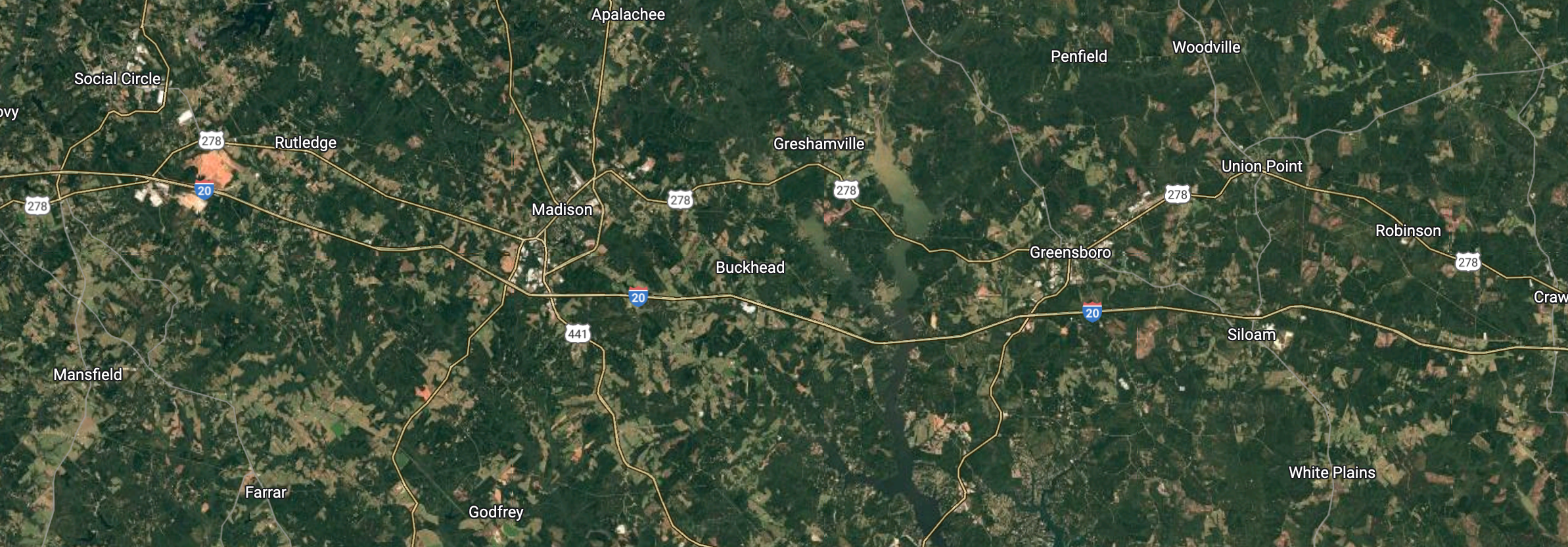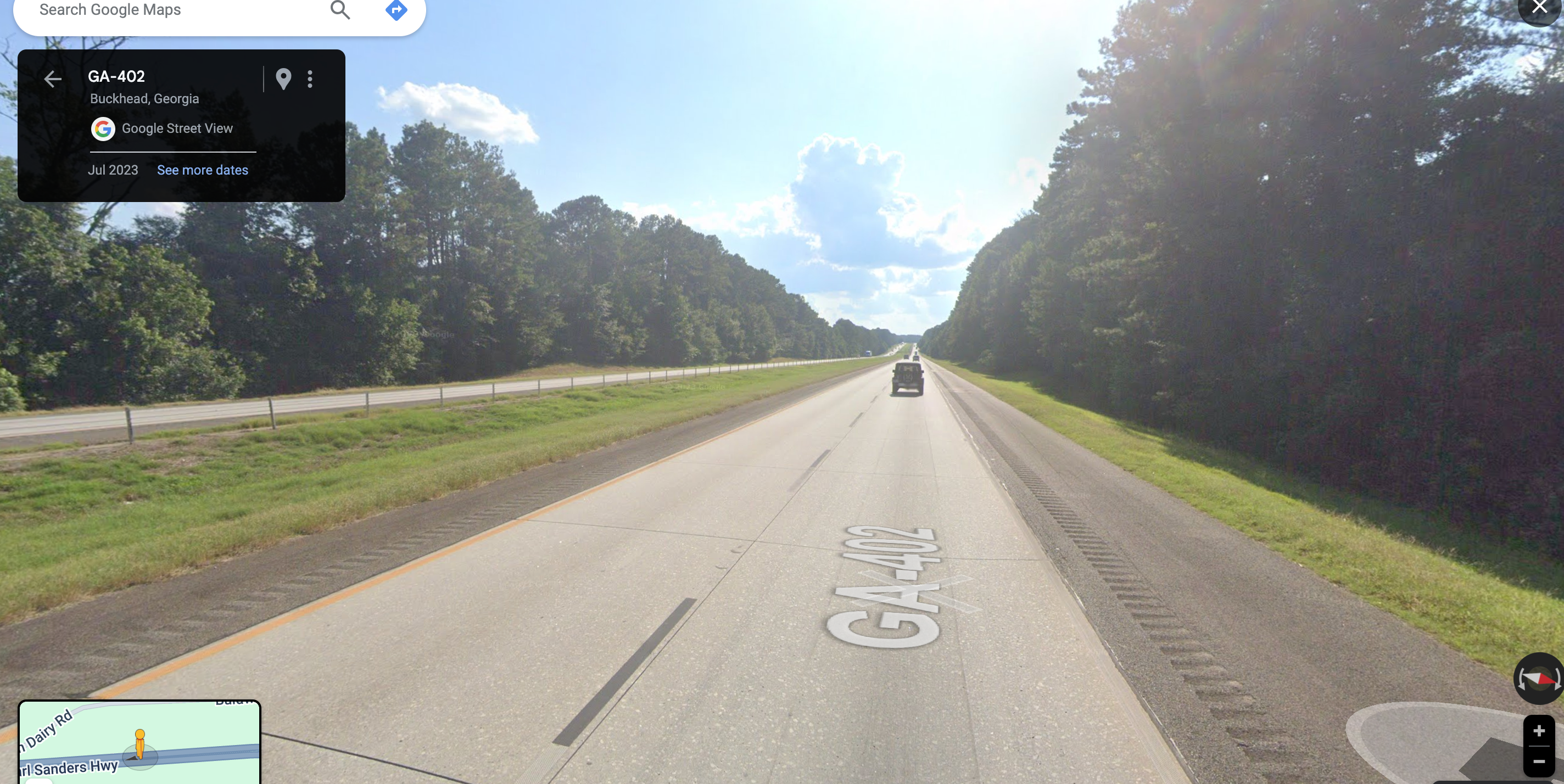The Current World
There are two worlds: the human-constructed world and the natural world, which has become so endangered it is now the realm of preserves and refuges inside the first world.
It struck me, driving on I-20, that I lived in a simulation. I thought that driving to Atlanta, all around me was forest and this part of the world was not nearly as developed as it is.



But it was merely a mirage, a small amount of recently grown trees to serve as a buffer to the highway. The hardwoods have long been cut down. Every bit of land has been planned and alloted. There is no more unclaimed land.
Human Ingenuity
What has given humans such power is the capability for abstract thought by simulating hypothetical worlds. People make better decisions when they look ahead at multiple hypothetical world-states, such as in chess.
On a more primal level, it might mean planning ahead to ambush the herd at a chokepoint.
If we live in three spatial dimensions plus the one temporal dimension of time, the ability to think of multiple timelines is thinking in five dimensions, except that it takes a lot of energy and time to do so and think of these exception cases. Spiders too can apparently think ahead, but it takes them a long time.
Thinking of multiple timelines isn’t easy. It takes energy to do so.
Keeping people distracted with social media, music, or games prevents them from using this power to think about what is happening around them or to think of alternatives.
The ability to think of alternative timelines and happenings is what gives rise to strategy. Grand strategy, rather than operational efficiency, as some would say.
Changing the hallucination
The human world is a hallucination, which means that it can be changed. People whose power rests on deluding others (think of how many infantry died for their ideals with the belief that those in power cared about them, software engineers who’ve imbibed the “do good things and help other people” mantra) don’t want to call it a hallucination. They don’t even want you to realize reality can be any other way.
Agency
Many definitions don’t exactly capture human agency in the way I feel is right. A commonly given answer is something like this:
For our purposes, an agent is an entity capable of autonomous, intelligent, goal-directed behavior.
The default assumption of many in life is that we have “goals.” But that doesn’t make sense. How can “goals” build a city or company? How can goals inspire and lead? Goals are something like:
- I will get a good job (without definition of what good is, except based on the general perception)
- I will lift more weights (without the question of why lifting more weights is important)
Goals, I think, are a subset of mimesis. Goals are for followers to have, not leaders.
Local state into global state
I recently heard a definition that clicked: agentic behavior is turning local state into global state.
Local state is in the brain. Global state is the world around us. When the brain feels like a television on the wall is uneven, this perception in local state causes the human to change global state.
The organism exudes its local state out into the environment to the best of its ability. Someone with a dirty environment has a jumbled mind. This becomes more and more clear to me when you see the houses of people who are ill mentally or physically. This becomes clear when you see the increasingly diminutive drawings of those with dementia.
Someone might have a great imagination but little power to change the world, so they make art, movies, music.
Our constructed world is a reflection of the local state in our minds. Walking through a beautiful city is inhabiting the beautiful minds of people long ago. Sometimes, like Paris, it may just be the mind of a few people who planned the street patterns. Through energy to construct the world and the thought that originated it, people’s states of mind are transmitted across time.
Three Parts of an Agent
- Humans have three parts
- Local state (the brain or genetic intuition/algorithms)
- Actions that update the environment (changing the global state)
- Speech, writing, choices, habits, material constructions/tools, social constructions
- Perceiving the environment (updating local state from global state/natural selection)
- The discriminating factor (perceptiveness, taste, knowing what is important and what is not) to update internal/local state
- Mimesis
Local State in the Digital Age
Some people are poorly able to perceive the environment around them so they rely overly on mimesis or accept media as truth. This may stem from an authority bias, a lack of perception, or a lack of contrast of different places in one’s life.
Their local state has been completely replaced by that of someone else’s, which means their actions are similar.
Examples include people ranting about politics in a grocery store, men stating that “marriage is a sham,” eating bland chicken and rice to make gains in the gym, and all other forms of copying others and unoriginal thought.
The issue with updating your local state with online content is that most of it is low quality. Depth and expertise are naturally wrought out by experience, so having a central source of truth (the internet or the media) can never be as dynamic as people thinking for themselves in local conditions.
Books and the internet serve as a source of local state for the human superorganism. Since most of the information on the internet is bad and most people cannot discriminate bad information, the local state and actions in society become worse.
Documentation or ERP systems are a way for large groups of people to work together. A common term is that “if it’s not in the ERP, it doesn’t exist.”
Who is responsible for decision making?
An issue that arises as groups scale is something like this: a boss tells a person to go out and canvas a neighborhood.
Or in a hospital: one person delays the paperwork, another person delays
Mental Conception
Mental conception forms the template for tool-making and object transformation. Without a mental image, tools cannot be made. Books also transmit mental conception across time.
Taking actions in the environment off-loads thought into it. Since learning decays, it may be more important to produce artifacts (flashcards, notes) that quickly re-invigorate learning rather than focusing on remembering everything.
People who repeat are mainly enforcing another person’s mental conception.
Detail, subtlety, and nuance are the characteristic of high mental conception. Simple rules are of base mental conception.
Why is properly perceiving things and having an opinion important? (In the current zeitgeist, also known as taste). Properly perceiving things means updating local state appropriately, which is reflected into the world through one’s actions.
A difference of opinion is a matter of life and death. Different thought or internal state leads to different action, leading to different built worlds, inevitably leading to conflict. Sometimes even having a different idea can be considered threatening. Of course, the world isn’t that dense, so there is always the option of going to do your own thing somewhere else.
My taste in articles about taste
I like this for its conciseness and insightfulness:
I feel like these, although true, repeat too much rather than getting to the core of things:
- https://www.paulgraham.com/taste.html
- https://jzhao.xyz/posts/aesthetics-and-taste
- https://asterisques.com/Taste
- https://karrisaarinen.com/jiro/
- http://jiggity.com/techtaste.html
- https://callum.website/the-matter-of-taste
I don’t like these:
Enlightenment
Saying the same thing
I do believe that the external world is malleable from within the mind, in much the same way that a projected image can be warped by modifying the projector or lens. Indeed, the ‘external world’ is in large part a projection of consciousness through the prism of the mind.
- https://dons.directory/transmissions/mental-steroids-and-modern-bodybuilding
- https://dons.directory/informatics/young-prince-s-conceptual-toolkit
Saying the same thing
You cannot lose unless you think the U.S. Treasury is going to default. But they still didn’t do it, and I was stunned. Later in life, as I competed against the banks, I would think back to this moment, and it gave me confidence. All the bankers did was copy what everyone else did. If everyone else ran off a bloody cliff, they’d run right off a cliff with them.
– Elon Musk
Saying the same thing
Say nothing of my religion. It is known to my God and myself alone. Its evidence before the world is to be sought in my life; if that has been honest and dutiful to society, the religion which has regulated it cannot be a bad one.
—Thomas Jefferson.
Hope
Thus I was saved from suicide. When and how this transformation within me was accomplished, I could not say. Just as the life force within me was gradually and imperceptibly destroyed, and I encountered the impossibility of life, the halting of life, and the need to murder myself, so too did this life force return to me gradually and imperceptibly. And the strange thing is that the life force which returned to me was not new but very old; it was the same force that had guided me during the early periods of my life. In essence I returned to the first things, to the things of childhood and youth. I returned to a faith in that will which gave birth to me and which asked something of me; I returned to the conviction that the single most important purpose in my life was to be better, to live according to this will. I returned to the conviction that I could find the expression of this will in something long hidden from me, something that all of humanity had worked out for its own guidance; in short, I returned to a belief in God, in moral perfection, and in a tradition that instills life with meaning. The only difference was that I had once accepted all this on an unconscious level, while now I knew that I could not live without it.
– Tolstoy, Confessions
Hope #2
https://www.sscnet.ucla.edu/polisci/faculty/chwe/austen/lasker1907.pdf
The fishermen were asked to have faith in spite of the raging tempest. We may presume then that the test of faith comes in the midst of difficulties and misfortunes. Hence faith is a belief that the forces of life act not blindly but are, manlike, subjected to the working of a principle of justice. Who has faith does not fear.
When our life presents hardships, when we cannot master the difficulties, and doubts of our ability discourage us, hope tells us to do our best and to wait. When we are in the presence of immense forces and a sense of our insignificance assails us, faith whispers into our ear not to fear injustice. Hope and faith still the heart beat when will and reason cannot overcome obstacles, and therefore doubt and anxiety make the heart tremble.
No being is born without hope. Hope is the propelling power of all life. Even the lowest animals live cheerfully, though pain or death may immediately overtake them.
Hope #3
The observations of this one case and the conclusion drawn from them are in accordance with something that was drawn to my attention by the chief doctor of our concentration camp. The death rate in the week between Christmas, 1944, and New Year’s, 1945, increased in camp beyond all previous experience. In his opinion, the explanation for this increase did not lie in the harder working conditions or the deterioration of our food supplies or a change of weather or new epidemics. It was simply that the majority of the prisoners had lived in the naive hope that they would be home again by Christmas. As the time drew near and there was no encouraging news, the prisoners lost courage and disappointment overcame them. This had a dangerous influence on their powers of resistance and a great number of them died.
As we said before, any attempt to restore a man’s inner strength in the camp had first to succeed in showing him some future goal. Nietzsche’s words, “He who has a why to live for can bear with almost any how,” could be the guiding motto for all psychotherapeutic and psychohygienic efforts regarding prisoners. Whenever there was an opportunity for it, one had to give them a why—an aim—for their lives, in order to strengthen them to bear the terrible how of their existence. Woe to him who saw no more sense in his life, no aim, no purpose, and therefore no point in carrying on. He was soon lost. The typical reply with which such a man rejected all encouraging arguments was, “I have nothing to expect from life any more.” What sort of answer can one give to that?
– VE Frankl, Mankind’s Search for Meaning
Conclusion
The world is mainly a human hallucination, not the natural world.
Humans can think in 5-dimensions, or one extra temporal dimension, also known as thinking of alternatives or multiple timelines.
Abstract thinking is the basis for lies and evil.
Internal state is the basis for agentic action in the world. Goals are the basis for mimesis.
Having the perception to recognize the shape of the world allows the right action to be taken.
Mental conception can be transmitted through time due to the environment or books.
Enlightenment is to understand that there are no rules.
Hope and faith is the answer to meaninglessness.